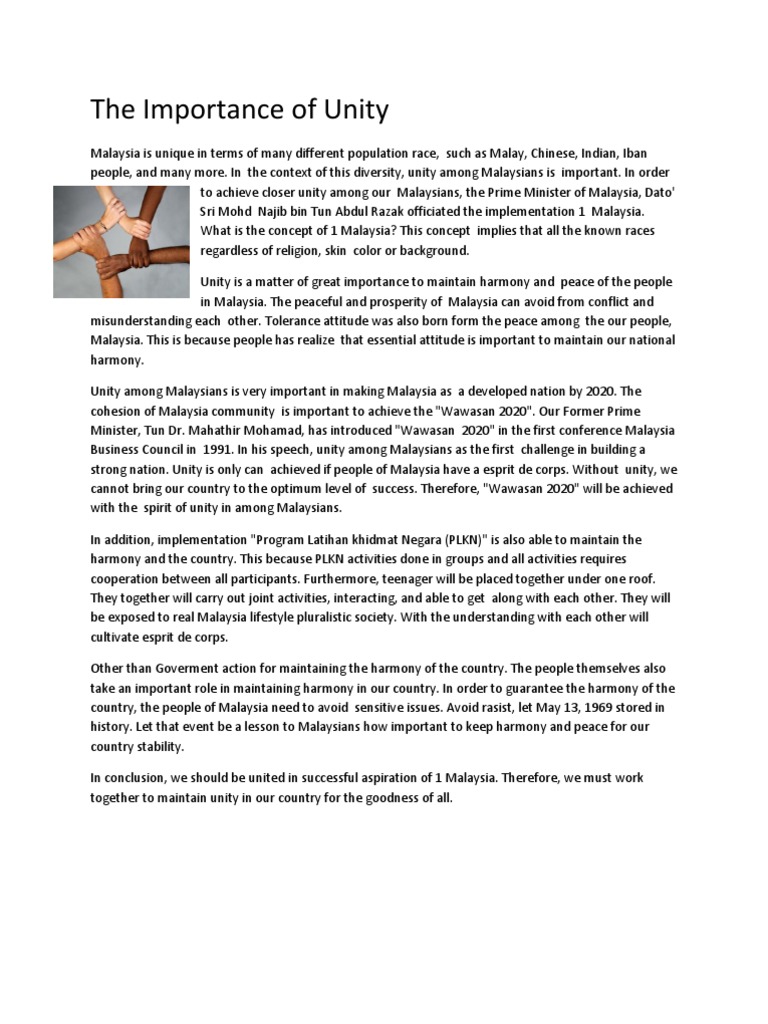The Bahá’í teachings inherently underscore the paramount importance of unity, positing it as a key principle for the advancement of society and the cultivation of an enduring world civilization. This unity is not merely ephemeral camaraderie; rather, it is a profound, systemic, and dynamic force that binds humanity, transcending the multitude of divisions that have historically fragmented social existence. In exploring the overriding importance of developing unity, various angles emerge. These include unity in diversity, the relationship between unity and peace, the concept of collective progress, and the spiritual underpinnings that nurture such an ethos.
To begin with, the principle of unity in diversity lies at the heart of the Bahá’í worldview. This concept acknowledges that human beings are endowed with differing beliefs, cultures, and characteristics, all of which contribute uniquely to the rich tapestry of human experience. Rather than being a cause for division, these differences should be celebrated and harnessed. The Bahá’í teachings encourage individuals to appreciate the inherent value in each culture and belief system, suggesting that true unity is achieved not through uniformity but through a mutual understanding and respect for diversity. When individuals engage with one another across cultural divides, they often discover common ground that fosters relationships that are deeper and more meaningful than those created through superficial interactions.
Moving beyond the individual level, the implications of unity resonate significantly at the collective level, particularly in relation to global peace. History has shown that discord breeds conflict, while unity fosters harmony. The Bahá’í teachings suggest that peace is not simply the absence of war but rather the presence of justice, understanding, and cooperation. In practical terms, this means that societies must prioritize the development of unity among their members, especially during periods of turmoil. By creating an environment where individuals feel valued and connected to one another, the likelihood of discord diminishes, paving the way for constructive dialogue and collaborative problem-solving. This philosophy can be applied in various contexts, from community building to international relations, where the intention to unite can serve as a catalyst for resolving long-standing disputes.
The notion of collective progress accentuates the interdependence of humanity. Within the Bahá’í framework, the advancement of any individual is inextricably linked to the wellbeing of the community. This principle is especially relevant in the contemporary context, where global challenges such as climate change, poverty, and inequality require a concerted effort across borders. Addressing these issues necessitates a unified approach; one that recognizes that solving global problems requires collaboration among diverse stakeholders, including governments, NGOs, and citizens alike. When unity is prioritized, innovative solutions can emerge from the convergence of various perspectives and expertise, ultimately leading to holistic advancements that benefit all.
Furthermore, the spiritual dimension of unity plays a crucial role in galvanizing individuals toward collective action. Bahá’í teachings advocate for the recognition of each individual’s inherent worth and dignity as a reflection of God’s creation. This perspective fosters a sense of responsibility toward others, motivating individuals to contribute positively to the society of which they are part. The concept of service is deeply embedded in Bahá’í teachings; it encourages followers to channel their energies toward uplifting others and promoting unity. This spiritual commitment to serve transcends personal interests and invites individuals into a collective journey where the focus rests on shared goals and aspirations.
In addition to individual and collective dynamics, the cultivation of unity also yields significant benefits for organizational and institutional functioning. Organizations that embrace a culture of unity often experience enhanced collaboration, productivity, and morale. In the workplace, for example, teamwork thrives in environments where members feel a sense of belonging and trust. The Bahá’í teachings elucidate that this sense of trust is cultivated through open communication, mutual respect, and a shared vision. Organizations adept in nurturing such conditions are better equipped to navigate challenges and celebrate successes, ultimately leading to sustained growth and innovation.
Moreover, achieving unity necessitates an ongoing process marked by intentional effort and perseverance. It is not an endpoint but a continual commitment to fostering connections, resolving conflicts, and striving for cohesion. This commitment manifests itself in various avenues: educational initiatives that promote inclusivity, community programs that engage diverse groups, and strategic dialogues that seek to bridge gaps of misunderstanding. Each effort, no matter how small, contributes to the broader tapestry of unity that the Bahá’í teachings so ardently advocate.
Lastly, the importance of unity cannot be overstated as it extends well beyond mere philosophical musings; it represents a fundamental necessity for the survival and flourishing of humanity. The challenges facing the world today call for a collective consciousness, proactive engagement, and a renewed sense of purpose that prioritizes unity over division. The Bahá’í teachings serve as a guiding framework in this regard, articulating a vision where harmony prevails and differences become opportunities for collaboration and growth. In essence, to embrace unity is to embrace the future, one where humanity can thrive in an equitable, just, and peaceful world.
